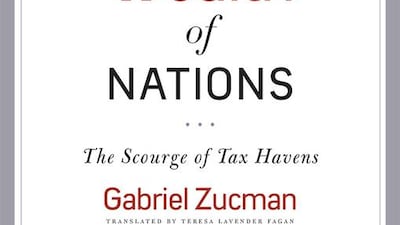When the academic Gabriel Zucman decided to take a critical look at tax havens and the wealth hidden there, what distinguished his work from other studies was his reliance on data to build his case.
Published in September, Zucman says his economic study, The Hidden Wealth of Nations – The Scourge of Tax Havens, draws on more than four years of research. To complete the work, the author analysed often previously unused sources on international investments of countries, on and off-balance sheet positions of banks, and the accounts of multinational firms.
This slim volume is divided into five parts. The first takes the reader through the history of tax havens over the past century, starting with Switzerland, the No 1 offshore centre historically and contemporaneously, and moving on to the newer players in the game: Hong Kong, Singapore, Jersey, Luxembourg and the Bahamas. He also provides a 101 on how tax fraud is committed.
Zucman then moves on to discuss the data, calculating that of the world’s entire wealth, which amounted to US$95.5 trillion in 2014, 8 per cent, or $7.6tn, is held in accounts in tax havens. This amounts to $200 billion in lost tax to governments worldwide.
Section three looks at previous, mostly failed, attempts to clamp down on tax havens. Zucman also sets out his own solution. This is a two-pronged approach that relies on “concrete sanctions proportional to the costs imposed by uncooperative tax havens to other countries” and “an international financial register”.
The last section investigates how multinational companies avoid paying tax. By his reckoning, US firms avoid paying $130bn in tax annually. The biggest perpetrators, he says, are the companies of the new economy: Google, Apple and Microsoft.
If a book about tax havens sounds dull, it is in fact quite the opposite. Zucman’s musings are both simple to understand and compelling. He also does a good job of explaining why tax evasion matters. It also benefits from being short enough to zip through in an evening.
q&a taxing matters
Lianne Gutcher expands on Gabriel Zucman's book The Hidden Wealth of Nations:
Why do tax havens matter?
As French economist and author Thomas Piketty notes in the introduction: “Tax havens are one of the key driving forces behind rising wealth inequality as well as a major threat to our democratic societies. Moderns democracies are based on a fundamental social contract: everybody has to pay taxes on a fair and transparent basis, so as to finance access to a number of public goods and services. Dodging taxes puts that social contract at stake.”
Why is this issue particularly relevant now?
Mr Zucman argues that if you look at countries such as Greece, governments would not have to impose as much austerity on their citizens if tax-avoiding elites were brought to heel.
We don’t pay tax in the UAE. So, is this book relevant to people here?
It’s true that the UAE and other Gulf states do not collect tax, so no revenue is lost by parking wealth offshore. However, as Zucman points out, petrodollars went to Switzerland in the 1970s rather than the US for the reason that “Zurich offered the advantage of anonymity” and investments escaped scrutiny. Even now, while 8 per cent of the world’s financial wealth is held in tax havens, this rises to 30 per cent in Africa, and 50 per cent in Russia and the Middle East.
Where can I see the data and calculations made by Gabriel Zucman in the book?
Those interested in the data can visit www.gabriel-zucman.eu.
business@thenational.ae
Follow The National's Business section on Twitter

